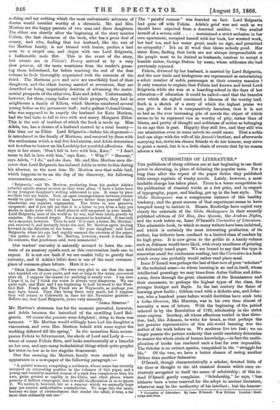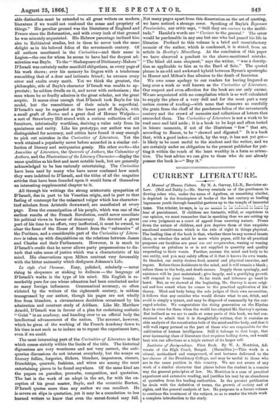CURIOSITIES OF LITERATURE.* THE publishers of cheap editions are at
last beginning to use their power in elevating, in place of debasing the popular taste. For a long time after the repeal of the paper duties they published little except reprints of trashy novels. Lately, however, a most laudable change has taken place. There is a warm competition in the publication of classical works at a low price, and in respect of typography, paper, and binding, got up in the best style. The Globe Shakespeare was a conspicuous instance of this healthy tendency, and the great success of that experiment seems to have tempted many to imitate it. Messrs. Routledge have copied very closely the externals of the Globe Shakespeare in their recently published editions of Gil Blas, Don Quixote, the Arabian Nights, and the work before us, Isaac D'Israeli's Curiosities of Literature. This admirable book, to which so many writers have been indebted, and which is certainly the most interesting production of its author, has hitherto been confined to a limited class of readers by its high price. It is now given to the public in a handy volume such as Johnson would have liked, with every excellence of printing and delicately toned paper. We are bound to say that the type is somewhat small for continuous reading, but the Curiosities is a book which every one probably would rather read piece-meal.
Isaac D'Israeli was perhaps the last of that race of pure "scholars' in the technical sense—to whom learning is an end in itself, whose intellectual genealogy we may trace from Aulus Genius and Athe- nmus, down through the great classicists of the Renaissance and their successors, to perhaps the highest types of the class, the younger Scaliger and Bayle. In the last century the flame of learning grew feeble ; Gibbon read with a definite aim, and John- son, who a hundred years before would doubtless have sunk into a helluo librorum, like Muretus, was in his own time almost of necessity a man of letters. With the beginning of the period ushered in by the Revolution of 1789, scholarship in the strict sense expires. Southey, all whose affections tended in that direc- tion, had, like Johnson, to-write for bread, so that perhaps the last genuine representative of this old-world learning was the author of the work before us. We moderns live too fast ; we no longer possess the patient audacity that could resolutely determine to master the whole circle of human knowledge,—in fact the multi- plication of books has rendered such a feat for ever impossible. The Scholar is an extinct species, vanquished in the "struggle for life." Of the two, we have a better chance of seeing another Milton than another Salmasius.
D'Israeli, though characteristically a scholar, devoted little of his time or thought to the old classical domain which once ex- clusively arrogated to itself the name of scholarship ; of this in- deed D'Israeli gently complains. " Scholarship," he says, "has hitherto been a term reserved for the adept in ancient literature, j whatever may be the mediocrity of his intellect ; but the honour-
! • Curiosities of Literature. By Imo D'Israeli. New Edition. London: Rout- ledge and Sono. able distinction must be extended to all great writers on modern literature if we would not confound the sense and propriety of things." His peculiar ground was the literatures of England and France since the Reformation, and with every inch of that ground he was minutely acquainted. His Hebrew parentage inclined him also to Rabbinical studies, but in these he never took the same delight as in his beloved folios of the seventeenth century. Of all authors mentioned in the Curiosities—and their name is Legion—the one for whom he seems to have had the deepest ad- miration was Bayle. To the " Shakespeare of Dictionary-Makers " D'Israeli was certainly under manifold obligations, as every page of his work shows ; over his memory he lingers with a tenderness resembling that of a dear and intimate friend ; he excuses every error and exalts every merit. Yet we think the greatest, the philosophic, side of Bayle's character D'Israeli was unable to ap- preciate ; he seldom dwells on it, and never with enthusiasm ; the man whom he so fondly admires is the great scholar, not the great sceptic. It seems clear enough that D'Israeli took Bayle for his model, but the resemblance of their minds is superficial. D'Israeli's may be regarded as the lesser part of Bayle's, with a small graft of Burton and a great deal of Horace Walpole— a sort of Strawberry Hill stored with a curious collection of old furniture, intrinsically worthless, deriving a value only from its quaintness and rarity. Like his prototype, our author was not distinguished for accuracy, and critics have found it easy enough to pick out mistakes in the Curiosities of Literature. Yet the work attained a popularity never before accorded in a similar col- lection of literary and antiquarian gossip. His other works—the Amenities of Literature, the Quarrels of Authors, the Calamities of Authors, and the Illustrations of the Literary Character—display the same qualities as his first and most notable book, but are generally acknowledged to be less variously entertaining. The Curiosities have been used by many who have never confessed how much they were indebted to D'Israeli, and the titles of all the magazine articles that have been founded upon it would form of themselves an interesting supplemental chapter to it.
All through his writings the strong aristocratic sympathies of D'Israeli, due in part to his Venetian origin, and in part to that feeling of contempt for the unlearned vulgar which has character- ized scholars from Aristotle downward. are manifested at every -page. Even the emancipation of his people, which was one of the earliest results of the French Revolution, could never conciliate his political views in favour of democracy. He devoted a great part of his time to an effort, very ineffectual, it must be owned, to clear the fame of the House of Stuart from the " calumnies " of the Puritans, and a considerable part of the Curiosities of Litera- ture is taken up with disquisitions on the relations between James and Charles and their Parliaments. However, it is much to D'Israeli's credit that he never allows party prepossessions to dis- turb that calm sense of justice which was a characteristic of his mind. His observations upon Milton contrast very favourably with the bitter animosity which disfigures Johnson's Life.
Le style c'est rhomme. Easy, polished, scholarly — never rising to eloquence or sinking to dullness — the language of D'Israeli's works is the type of his mind. His English is re- markably pure for one whose education had been conducted under so many foreign influences. Grammatical accuracy, so often violated by the writers of the eighteenth century, is seldom transgressed by our author, though his pages are not wholly free from blunders, a circumstance doubtless occasioned by his admiration and constant study of Addison. Like Mr. Matthew Arnold, D'Israeli was in favour of a plan for enshrining aesthetic " Geist" in an academy, and handing over to an official body the intellectual advancement of the nation. The account, however, which he gives of the working of the French Academy down to his time is not such as to induce us to repeat the experiment here, even if we could.
The most interesting part of the Curiosities of Literature is that which comes strictly within the limits of the title. The historical digressions are very wearisome and not very correct, the anti- quarian discussions do not interest everybody, but the essays on literary follies, forgeries, filchers, blunders, impostures, sinners, friendships, quarrels, fashions, and wives are among the most entertaining pieces to be found anywhere. Of the same kind are the papers on parodies, proverbs, composition, and quotation. The last is the work of an adept in the art, for with the ex- ception of his great master, Bayle, and the eccentric Burton, D'Israeli quotes more than any author we can recollect. He is severe on slips in quotation, yet it may be a consolation to less learned writers to know that even the surest-footed may fall.
Not many pages apart from this dissertation on the art of quoting, we have noticed a strange error. Speaking of Bayle's Reponses Provinciale.s, our critic says, " Still they are caviare to the multi- tude." Hamlet's words are " Caviare to the general." The error would be pardonable in any one but one who had passed his life in libraries. Prefixed to this volume is a brief and unsatisfactory memoir of the author, which is condensed, it is stated, from an article in Bentley's Miscellany. At the conclusion of this paper we have observed a pendant to the above-mentioned mistake. "The blind old man eloquent," says the writer, " was a descrip- tion as applicable to him as to the Bard of Scio." The quoted phrase is an odd and awkward hybrid between Byron's apostrophe to Homer and Milton's fine allusion to the death of Isocrates.
We owe some apology to our readers for having lingered so long over a work so well known as the Curiosities of Literature. Our respect and even affection for the book are our only excuse. We are acquainted with no compilation which is so well calculated to supply the place of a very dull and for the most part a very useless course of reading—with none that winnows so carefully the grain from the chaff of the ponderous folios of the seventeenth century and the crowd of memoirs and collections of letters that succeeded them. The Curiosities of Literature is not a work to be read once and laid aside ; it is a book to be kept and often tasted in leisure moments, if not of the illustrious " few " that are, according to Bacon, to be " chewed and digested." It is a book that, with a good index—which, by the way, it has not yet got— is likely to be most useful to the student and the writer, and we are certainly under an obligation to the present publisher for put- ting it within the reach of the least wealthy in a form so attrac- tive. The best advice we can give to those who do not already possess the book is—" Buy it."































 Previous page
Previous page